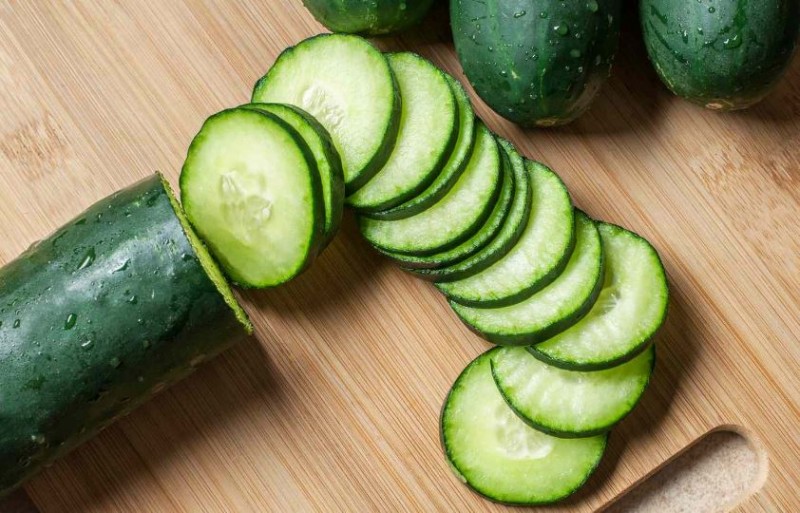
Cucumber, often relished during summers, is a reservoir of numerous nutrients like Vitamin C, K, potassium, and copper. While it's widely loved for its health benefits, it's important to acknowledge that consuming cucumber may pose certain risks that shouldn't be overlooked.
Dehydration:
Cucumber, a quintessential summer snack, is lauded for its hydrating properties due to its high water content. However, despite its reputation as a hydrating food, excessive consumption, particularly of cucumber seeds, can paradoxically lead to dehydration. This phenomenon stems from the presence of cucurbitacin, a compound found in cucumber seeds, which has diuretic properties, meaning it promotes the production of urine, thereby increasing water loss from the body.
Cucurbitacin acts as a natural defense mechanism for the cucumber plant, deterring pests with its bitter taste. While the amount of cucurbitacin in cultivated cucumbers is typically low and considered safe for consumption, excessive intake, especially of the seeds, can potentially lead to dehydration. Therefore, individuals who consume large quantities of cucumber, particularly in the form of cucumber juice or smoothies where the seeds are often included, should be cautious of their hydration levels.
To mitigate the risk of dehydration while enjoying cucumbers, it's advisable to consume them in moderation and consider removing the seeds, which are the primary source of cucurbitacin. Additionally, ensuring adequate hydration by drinking water alongside cucumber consumption can help offset any potential water loss induced by cucurbitacin.
Constipation:
Cucumber, while being a refreshing and low-calorie snack, may pose challenges to digestive health if consumed improperly. Late-night consumption of cucumbers, especially in conjunction with dinner, can disrupt the digestive process and potentially lead to constipation.
The issue arises from the fact that cucumbers, particularly when consumed raw and in large quantities, contain insoluble fiber, which adds bulk to stool but does not dissolve in water. While fiber is essential for promoting regular bowel movements and preventing constipation, excessive intake, especially without adequate hydration, can exacerbate digestive issues.
Furthermore, the skin of cucumbers contains insoluble fiber, which, if not chewed thoroughly or removed, can be difficult for the digestive system to break down, leading to gastrointestinal discomfort and constipation.
To avoid constipation while enjoying cucumbers, it's recommended to consume them earlier in the day, allowing ample time for digestion before bedtime. Additionally, peeling or thoroughly chewing cucumbers can help facilitate digestion and reduce the risk of constipation.
Aggravation of Sinus Issues:
Cucumber's cooling properties, while refreshing during hot weather, may exacerbate sinus problems if consumed inappropriately, particularly at night. Sinusitis, characterized by inflammation of the sinuses, can cause symptoms such as nasal congestion, sinus pressure, and headaches.
Cucumbers, with their cooling and hydrating properties, are often consumed to alleviate heat-related discomfort. However, consuming cucumbers, especially before bedtime, can potentially worsen sinus issues by increasing mucus production and nasal congestion.
Moreover, individuals prone to sinusitis may experience heightened symptoms when exposed to cold or cooling foods like cucumbers, as they can further irritate inflamed sinus passages.
To prevent exacerbation of sinus issues while enjoying cucumbers, it's advisable to consume them earlier in the day and in moderation. Additionally, individuals with chronic sinus problems should consider avoiding cucumbers altogether or consulting with a healthcare professional for personalized dietary recommendations.
Troubles for Pregnant Women:
Pregnant women, while benefiting from the nutritional content of cucumbers, should exercise caution to avoid potential complications associated with excessive consumption.
Cucumbers are a rich source of water and various vitamins and minerals, making them a healthy choice for pregnant women looking to stay hydrated and nourished. However, consuming cucumbers in excess can lead to issues such as frequent urination and exacerbation of acidity, which may cause discomfort and pose risks to maternal and fetal health.
Furthermore, cucumbers contain cucurbitacin, a compound that, in large amounts, can induce digestive issues and potentially harm both the mother and the developing fetus.
To ensure the safety of cucumber consumption during pregnancy, it's essential for expectant mothers to adhere to moderation and listen to their bodies' signals. Any discomfort or adverse reactions experienced after consuming cucumbers should be promptly addressed by consulting with a healthcare provider for guidance and personalized recommendations.
In conclusion, while cucumbers offer a plethora of health benefits, including hydration, fiber, and essential nutrients, it's crucial to consume them mindfully and in moderation to avoid potential adverse effects such as dehydration, constipation, exacerbation of sinus issues, and complications during pregnancy. By understanding the potential risks and implementing strategies to mitigate them, individuals can enjoy the nutritional advantages of cucumbers while safeguarding their health and well-being.
Unveil the Secret to Lustrous Locks with Lavaya Hair Active Oil
High cholesterol is becoming a silent killer, these symptoms appear in the body as it increases
Take special care of these things while removing kajal from eyes, otherwise these problems may occur